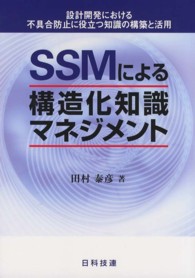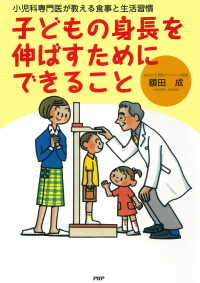- ホーム
- > 洋書
- > 英文書
- > Business / Economics
基本説明
Considers to what extent changes in organisations and in the nature of jobs are compatible with the need for greater integration between work and family life.
Full Description
Organisations and the nature of work have undergone fundamental changes in recent decades. At the same time, the traditional family pattern in Europe is being challenged by the growing number of dual-income families, and by the rise of women's employment. The central aim of this book is to consider to what extent changes in organisations and in the nature of jobs are compatible with the need, increasingly expressed by employees, for greater integration between work and family life. The book questions what sort of dilemmas modern and future employees face, in terms of shaping their careers and organising their lives at home. The authors formulate answers to these problematic questions by shedding light on relevant developments in the European labour markets, the European workplaces, in (flexible) working patterns, changing preferences for working hours and in gender relations at work.
With a focus on future developments, this book will be of interest to labour market researchers and social policymakers in Europe, and also students in the social sciences, management (HRM) and social policy.
Contents
Contents:
Preface
Part I: Change in a European Context
1. Introduction
2. Work and Family Life in Europe: Employment Patterns of Working Parents Across Welfare States
3. Organisational Change, Gender and Integration of Work and Private Life
4. New Working Arrangements and Organisational Change in the Netherlands
5. Occupational Sex Segregation and Societal Change
Part II: Flexible Working
6. Gender Equality and the Work-Life Balance: Policies and Practices in the New Economy
7. Flexibillisation, Deregulation and Working Time: A Gendered Question: Evidence from Spain
8. Long-term Effects of Flexible Work
Part III: Working Time, Leave Facilities and Teleworking
9. Employers' and Employees' Preferences on Working Time in Finland
10. Do Dutch Employees Want to Work More or Fewer Hours Than They Actually Do?
11. Internal and External Career Aspirations of Men and Women Within their Organisations
12. Assessing the Use of Parental Leave by Fathers: Towards a Conceptual Framework
13. IT and Telework
Part IV: The Integration of Work and Personal Life
14. Looking Backwards to go Forwards: The Integration of Paid Work and Personal Life
15. Flexible Work and Organisational Change from a European Perspective: Challenges for Future Research
Index








